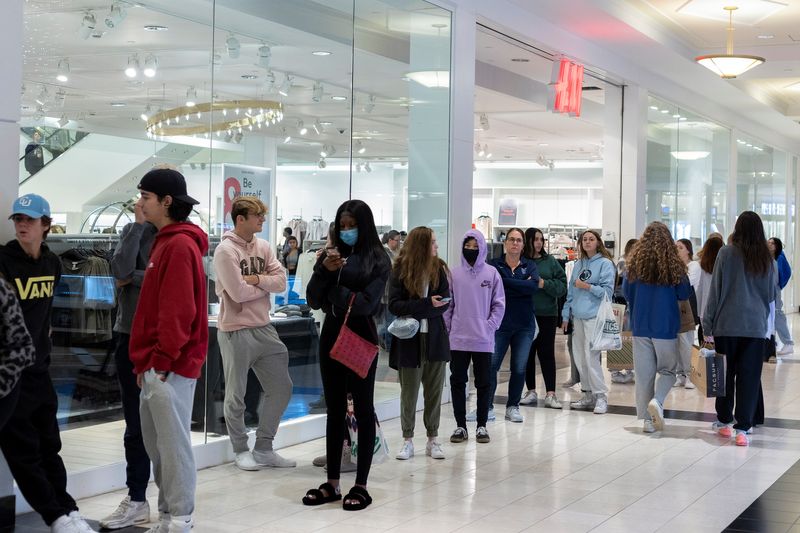By Lucia Mutikani
WASHINGTON (Reuters) - U.S. consumer spending fell for a second straight month in December, putting the economy on a lower growth path heading into 2023, while inflation continued to subside, which could give the Federal Reserve room to further slow the pace of its interest rate hikes next week.
The report from the Commerce Department on Friday also showed the smallest gain in personal income in eight months, in part reflecting moderate wage growth, which does not bode well for consumer spending. Though the drop in spending was mostly in the goods sector, services outlays essentially stalled.
"Hammered by higher prices and borrowing costs, and feeling less wealthy, U.S. households are cutting back, and will likely contribute to a contraction in GDP in the first quarter," said Sal Guatieri, a senior economist at BMO Capital Markets in Toronto. "The good news is that they are also pushing back against price hikes, which will help the Fed tackle inflation and limit further rate hikes."
Consumer spending, which accounts for more than two-thirds of U.S. economic activity, dropped 0.2% last month. Data for November was revised lower to show spending slipping 0.1% instead of gaining 0.1% as previously reported. Economists polled by Reuters had forecast consumer spending dipping 0.1%.
The data was included in the advance fourth-quarter gross domestic product report published on Thursday, which showed consumer spending maintaining a solid pace of growth and helping the economy to expand at a 2.9% annualized rate.
The weak handover to 2023 raises the risks of a recession by the second half of the year, but also reduces the need for the U.S. central bank to maintain an overly aggressive monetary policy stance. The Fed's fastest rate hiking cycle since the 1980s has pushed the housing market into recession and manufacturing is in the early stages of a downturn.
Higher borrowing costs have undercut demand for goods, which are typically bought on credit. In December, there was a broad decline in goods spending, partly reflecting lower gasoline prices, which undercut receipts at service stations.
Spending on long-lasting manufactured goods like motor vehicles, recreational goods and household furniture and equipment decreased 1.9%. Durable goods spending plunged 3.0% in November. Spending on nondurables like clothing and footwear declined 1.4% last month.
Though growth in spending on services is helping to anchor consumption, some households, especially those with lower incomes, have depleted savings accumulated during the COVID-19 pandemic, limiting the scope of gains.
Spending on services increased 0.5% last month, matching November's gain. Services outlays were supported by housing and utilities, air travel, and healthcare, as well as recreation.
But Americans cut back spending at restaurants and bars. That could have been the result of freezing temperatures or could be signaling consumers pulling back on discretionary spending as recession risks mount.
Stocks on Wall Street were mostly higher. The dollar rose against a basket of currencies. U.S. Treasury prices fell.
WAGE GAINS MODERATE
The personal consumption expenditures (PCE) price index edged up 0.1% last month after rising by the same margin in November. In the 12 months through December, the PCE price index increased 5.0%. That was the smallest year-on-year gain since September 2021 and followed a 5.5% advance in November.
Excluding the volatile food and energy components, the PCE price index gained 0.3% after climbing 0.2% in November. The so-called core PCE price index rose 4.4% on a year-on-year basis in December, the smallest advance since October 2021, after increasing 4.7% in November.
The Fed tracks the PCE price indexes for monetary policy. Other inflation measures have also slowed down significantly.
The improving inflation picture was underscored by the University of Michigan survey on Friday showing consumers' 12-month inflation expectations dropped to a 21-month low of 3.9% in January.
The Fed last year raised its policy rate by 425 basis points from near zero to a 4.25%-4.50% range, the highest since late 2007. Financial markets have priced in a 25-basis-point rate increase at the U.S. central bank's Jan. 31-Feb. 1 meeting, according to CME's FedWatch Tool.
"The economy isn't out of the woods when it comes to inflation, but monetary officials down in Washington are making progress in slowing the worrisome price increases seen in the first half of 2022," said Christopher Rupkey, chief economist at FWDBONDS in New York.
Adjusting for inflation, consumer spending fell 0.3% in December, the biggest decline in a year, after decreasing 0.2% in November. This puts consumer spending on a lower growth base at the start of the first quarter.
With personal income rising 0.2%, the smallest gain since April, after increasing 0.3% in November, the outlook for spending is uncertain. Wages rose 0.3%, matching November's increase. But there is hope that the biggest cost of living adjustment since 1981 for more than 65 million Social Security beneficiaries, which came into effect in January, will limit the decline in consumer spending.

Retreating inflation is also lifting consumers' purchasing power. Income at the disposal of households after accounting for inflation increased 0.2%. The savings rate rose to a seven-month high of 3.4% from 2.9% in November, with revisions to previous data showing a more moderate pace of savings drawdown than previously estimated
"We estimate households still have about nine months of spending power if they continued to draw down excess saving at the pace they have the past six months," said Tim Quinlan, a senior economist at Wells Fargo (NYSE:WFC) in Charlotte, North Carolina.
